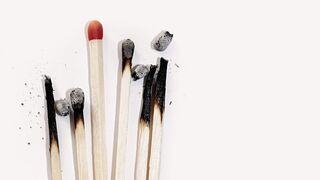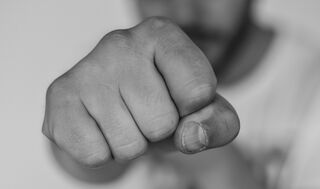Burnout
Burnout Is Causing Growing Hostility Towards Others
People are on a short fuse, increasingly prickly, and thoughtlessly lashing out.
Posted January 31, 2022 Reviewed by Davia Sills
Key points
- Burnout levels are skyrocketing during the pandemic, resulting in more angry and violent outbursts than usual.
- Despite knowing that cameras are everywhere, many people don't seem to worry about the consequences of dangerous or illegal behavior.
- Focusing on gratitude and compassion for others could help us change the new status quo for the better.

A fistfight broke out at my local CVS as I was waiting in line to pick up a prescription. A disgruntled customer there for a COVID vaccine started muttering to himself. He’d been “waiting too long,” he grumbled. His volume grew, and he began to curse out the pharmacy staff whom he claimed were “disrespecting” his time. Things went south from there.
Behind the counter, an obviously overwhelmed staff member gestured to another. “I’m this close!” she said, her hands trembling.
Moments later, she erupted, storming out from behind the counter to confront the unruly customer. Each shouted. Fists were raised. Other patrons swooped in to defuse the argument, but with marginal success.
As I exited the store later, I saw her pacing on the sidewalk, still agitated, cursing to herself. I didn’t think approaching her would help.
Welcome to what happens in burnout where people are flipping out like never before.
Broken free from conventional moorings, it is easy to drift into altercations and reflexive violence without thinking through the consequences.
For years, we have lived with a steady level of road rage. Now we have to confront escalating school rage, abusive patients, fisticuffs on airplanes and at restaurants. School board meetings have turned into battlegrounds.
Invective spews in every direction. In January, three women stomped on a security officer at JFK airport. The three are now under federal indictment for “out of control behavior.”

Given our evident exhaustion of resiliency, what does it even mean to be “in control” when people act out in ways they never would have before? We can see the new normal in many places, ramped up from relatively contained incidents, such as the one at my CVS store, to larger mayhem in the form of shootings, reckless driving, overdoses, heavy drinking, domestic violence, and more.
Collectively, our disruptive behavior seems to be signaling that the instinct to care for one another has collapsed. What if its loss is irreversible?
A Harlem man recently walked into a Burger King and killed a woman working behind the counter. Surveillance cameras, now a ubiquitous feature of American life, captured his senseless attack.
One wonders: if killers know that cameras are everywhere, then why go on killing? It is as if the deterrent of prison time is now beyond their imagination. Or else, if it is imagined, it registers as painless and free of consequence.
We have made personal accountability passé. Or at least the elites in authority have. Despite having taken an oath to “protect and defend the constitution,” District Attorneys across the country have unilaterally decided to dial down prosecution standards and let criminals go free.
As for partisanship, the left said nothing about the summer’s looting at the 2020 Democratic convention while the right addressed the 2021 Capitol riot with justifications after the fact. As columnist Daniel Henninger put it, we are facing a “cumulative corrosion of standards.”
The Black Lives Matters protests in 2020 with their anarchy of looting, arson, destruction, and street gangs, and the January 2021 riots seem in retrospect to be bookends. So far this year, a Harlem man wanted for questioning in a domestic dispute emptied his Glock pistol into three New York policemen who had responded to the disturbance. One cop died instantly; another succumbed days later.
What were the recent years' shooters, looters, celebrity sex offenders, and punch-you-in-the-face assailants thinking? They weren’t thinking at all. They just acted on impulse and did it.
The problem is that personal behavior has become thoughtless, untethered, unhinged.
Whether due to pandemic overload or too many years of divisive politics, ordinary people are now seething. Our patience and resilience, both individually and as a nation, have been tested.
The media typically amplifies self-serving politicians who flourish by stirring up discord and anger (Journalism 101: “If it bleeds, it leads”).
We cannot change the system easily. But as individuals, we can focus on gratitude and appreciating what we have. Think of all the public workers who toil tirelessly, unseen and unappreciated, certainly not thanked, when we visit the grocery store, the library, or take an Amazon package at the front door from a delivery driver who has been at it all day.
Person by person, we can rid ourselves of the negative stuff weighing us down by focusing on gratitude and compassion. The COVID years may yet turn out to be a catalyst for positive change.




